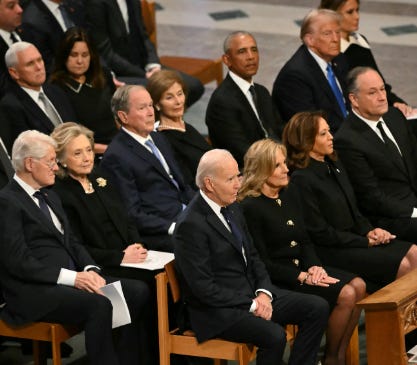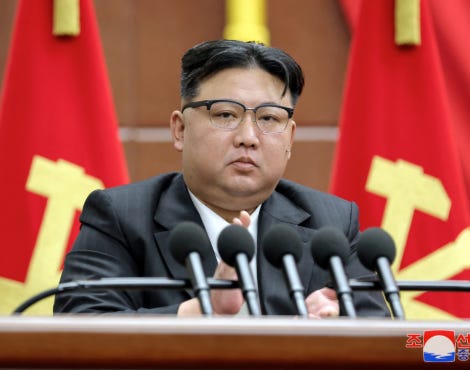(Dobbs) Carter's Funeral: What Do People In Russia Think If They See What We Saw?
Rigid political rivals sat side by side, unified by the death of a predecessor.
I think… and I hope… that if you watched this morning’s funeral at the National Cathedral for Jimmy Carter, you had the same feeling I had: “How incredible this is, how lucky we are, that all four living former leaders and the current leader of the world’s most powerful nation, as well as aspirants for its highest office like Hillary Clinton and Al Gore and Mike Pence and Kamala Harris, all qualified to be president but who didn’t make it to the top, are sitting side by side, their feuds and their frictions set aside, unified by the death of a predecessor!”
I have to wonder, what do people in Russia think if they see what we saw? Or in China? Or Iran, or North Korea, or other dictatorships whose leaders don’t fade into the sunset at the end of their terms. Russia’s Vladimir Putin has essentially made himself president for life. The same’s true of China’s Xi Jinping, who had his predecessors’ traditional two-term limit erased from the nation’s constitution and whose third five-year term was approved by his Communist party by a vote of 2,952 to 0. Iran’s Supreme Leader Ali Khamenei is, in theory, selected by a so-called Assembly of Experts, but the reality is, he has the sole voice in selecting or firing those experts, so they are indebted and loyal to him. And North Korea’s Kim Jong Un, who inherited unchallenged authority from his father and his grandfather before him? He answers to nobody.
None will have a panoply of predecessors at his funeral. None ever gave anyone else the chance.
What I saw covering dictatorships around the world was that outside of our Western democracies, there are only three options for a nation’s leader: perpetually hold fast to power, escape with your riches into exile, or death. There are no presidential libraries, no speaking tours, no government pensions, no quiet retirements behind a white picket fence. When they are at the top of the pyramid, they know that there is no place to go but down and that what they’ll find at the bottom isn’t good.
That’s what made the funeral so striking. Men and women who have been rigid political rivals sat together as eulogy after eulogy praised Jimmy Carter. Each leader, in his or her own way, was flawed when serving in office, some of them deeply, but each, while at the pinnacle of power, also represented the hopes and dreams of tens of millions of Americans and for that alone, they deserve respect. For my part, the former and now future president Donald Trump doesn’t deserve to sit in the same room let alone the same row as the rest of them, but he was there too, and even in this era of a diverse and divided nation, he and his seat-mate Barack Obama had what looked like a cordial, even warm conversation before Carter’s casket was carried in.
And a few words about Jimmy Carter himself. There were eulogies from members of his political team and members of his family, all of them underscoring what a decent man Carter had been. But none more than his grandson Jason, whose description of the Carter home in Plains, Georgia, underscored what a regular guy the onetime occupant of 1600 Pennsylvania Avenue really was: “You'd walk in the house and it was like thousands of other grandparents' houses all across the south: Fishing trophies on the wall, the refrigerator (of course) was papered with pictures of grandchildren and great-grandchildren, their main phone of course had a chord and was stuck to the wall in the kitchen like a museum piece, and demonstrating their Depression-era roots they had a rack next to the sink where they would hang ziplock bags to dry."
What all the eulogies made clear— including a touching one created by the man Jimmy Carter beat in 1976, Gerald Ford, after both former presidents became post-political friends and agreed to write eulogies for one another— was that reaching out to help people was a part of Carter’s soul. Even more so— from building houses to encouraging democratic elections to eradicating disease— in his post-presidency than during his presidency. My wife, watching the funeral with me, said when it was over, “You don’t get those kinds of eulogies unless you lived that kind of life.”
At the end of December, on the day he died, I wrote here on Substack about my own encounters with Jimmy Carter before, during, and after his presidency, and ended it with a story about interviewing him almost twenty years ago in Atlanta about his perpetual public service. I asked why, already in his 80s, he didn’t feel entitled to just sit in a rocking chair on his front porch in Plains and relax. What he said went pretty much like this: “I am in a unique position: I’m a former president of the United States of America. If I see a problem anywhere in the world, I can call a prime minister, a potentate, another president, and at least have a chance to be heard. Wouldn’t it be a pity to waste that?”
He wasn’t bragging. That wasn’t his way. He was just stating a reality: there were still good deeds he could do, and he wasn’t going to let them go unmet. My commentary that day ended saying, many other former presidents would. Jimmy Carter never did.
_________________________________________________________________________
A postscript….
In my last commentary, only a week ago tomorrow, I wrote that I was having major back surgery that day and that it would be a while before I returned to my keyboard. Many of you have found ways to write to me and ask, “How did it go?” The answer is, the surgical team was able to fuse more of my spine and evidently the surgery was a success, and after a few days in the hospital, I am home. It’s not easy and it’s not painless— it is tough to get down to a chair, tough to roll over in bed, tough to reach for a glass of water. I can’t really stay in one position for more than about a half-hour, which is why it took me three sittings just to write this piece about Jimmy Carter’s funeral. But while the road to recovery is slow and tests my patience, I am glad to be on it. Even more, I am lucky to be on it.
Over more than five decades Greg Dobbs has been a correspondent for two television networks including ABC News, a political columnist for The Denver Post and syndicated columnist for Scripps newspapers, a moderator on Rocky Mountain PBS, and author of two books, including one about the life of a foreign correspondent called “Life in the Wrong Lane.” He also co-authored a book about the seminal year for baby boomers, called “1969: Are You Still Listening?” He has covered presidencies, politics, and the U.S. space program at home, and wars, natural disasters, and other crises around the globe, from Afghanistan to South Africa, from Iran to Egypt, from the Soviet Union to Saudi Arabia, from Nicaragua to Namibia, from Vietnam to Venezuela, from Libya to Liberia, from Panama to Poland. Dobbs has won three Emmys, the Distinguished Service Award from the Society of Professional Journalists, and as a 38-year resident of Colorado, a place in the Denver Press Club Hall of Fame.
You can learn more at GregDobbs.net








In what way was Kamala qualified to be President of the USA ? Your statement is so brainless I skipped the rest... as worthless.
Glad the surgery went well and you are on the mend, UncGrg!